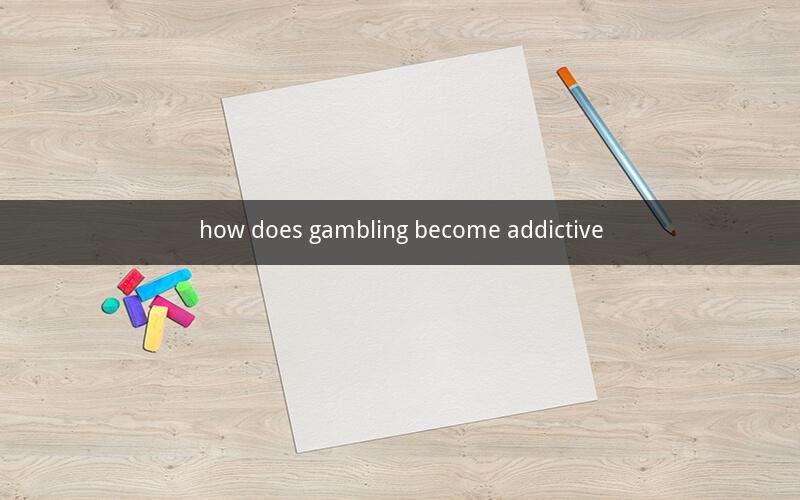
Table of Contents
1. Introduction to Gambling
2. The Psychology of Addiction
3. The Role of Dopamine in Gambling Addiction
4. Factors Contributing to Gambling Addiction
5. Signs and Symptoms of Gambling Addiction
6. The Impact of Gambling Addiction on Individuals and Society
7. Treatment and Prevention of Gambling Addiction
8. Conclusion
1. Introduction to Gambling
Gambling is a popular form of entertainment that involves risking money or valuable items on an uncertain outcome. It can be found in various forms, such as casinos, sports betting, lottery, and online gambling. While many people engage in gambling without any negative consequences, some individuals develop an addiction to it.
2. The Psychology of Addiction
Addiction is a complex psychological disorder characterized by compulsive engagement in rewarding stimuli despite adverse consequences. The psychology of addiction involves the brain's reward system, the role of environment, and personal factors.
3. The Role of Dopamine in Gambling Addiction
Dopamine is a neurotransmitter that plays a crucial role in the brain's reward system. When individuals engage in gambling, the release of dopamine creates a sense of pleasure and reinforces the behavior. Over time, the brain becomes accustomed to this pleasurable feeling, leading to a higher tolerance and a stronger desire to gamble.
4. Factors Contributing to Gambling Addiction
Several factors contribute to the development of gambling addiction, including:
- Genetic predisposition: Some individuals may have a genetic predisposition to addiction, making them more susceptible to developing gambling addiction.
- Environmental factors: Exposure to gambling opportunities, such as living near a casino or having friends who gamble, can increase the risk of addiction.
- Psychological factors: Individuals with low self-esteem, anxiety, or depression may turn to gambling as a way to cope with their emotions.
- Social factors: Peer pressure, family dynamics, and societal attitudes towards gambling can also contribute to addiction.
5. Signs and Symptoms of Gambling Addiction
Recognizing the signs and symptoms of gambling addiction is essential for early intervention. Some common signs include:
- Preoccupation with gambling: Constant thoughts about gambling, planning for the next gambling session, and reliving past gambling experiences.
- Compulsive behavior: Inability to control gambling, even when it leads to negative consequences.
- Financial problems: Borrowing money, selling possessions, or experiencing financial hardship due to gambling.
- Emotional and psychological issues: Increased stress, anxiety, depression, and other mental health problems.
6. The Impact of Gambling Addiction on Individuals and Society
Gambling addiction can have severe consequences for both individuals and society. For individuals, addiction can lead to financial, emotional, and psychological distress. In society, gambling addiction can result in increased crime rates, unemployment, and strained family relationships.
7. Treatment and Prevention of Gambling Addiction
Treating gambling addiction involves a combination of therapy, support groups, and lifestyle changes. Some effective treatment methods include:
- Cognitive-behavioral therapy (CBT): CBT helps individuals identify and change negative thought patterns associated with gambling.
- Support groups: Joining a support group, such as Gamblers Anonymous, can provide emotional support and a sense of community.
- Financial management: Learning to manage finances, setting budgets, and seeking financial counseling can help individuals overcome gambling-related financial problems.
Preventing gambling addiction involves implementing measures to limit exposure to gambling opportunities and promoting responsible gambling. This can include:
- Age restrictions: Requiring individuals to be of legal age to gamble.
- Education: Providing information about the risks of gambling and promoting responsible gambling practices.
- Self-exclusion programs: Allowing individuals to ban themselves from casinos or online gambling sites.
8. Conclusion
Gambling addiction is a complex disorder that can have severe consequences for individuals and society. Understanding the factors contributing to addiction, recognizing the signs and symptoms, and seeking appropriate treatment are essential for overcoming this problem. By promoting responsible gambling and implementing prevention strategies, we can help reduce the incidence of gambling addiction and its negative impacts.
Questions and Answers:
1. What is the role of dopamine in gambling addiction?
Answer: Dopamine plays a crucial role in the brain's reward system, creating a pleasurable feeling when individuals engage in gambling.
2. What are some factors contributing to gambling addiction?
Answer: Factors include genetic predisposition, environmental exposure, psychological issues, and social factors.
3. How can one recognize the signs and symptoms of gambling addiction?
Answer: Signs include preoccupation with gambling, compulsive behavior, financial problems, and emotional and psychological issues.
4. What are some effective treatment methods for gambling addiction?
Answer: Effective treatments include cognitive-behavioral therapy, support groups, and financial management.
5. How can individuals prevent gambling addiction?
Answer: Prevention involves implementing measures such as age restrictions, education, and self-exclusion programs.
6. What is the impact of gambling addiction on individuals?
Answer: Individuals may experience financial, emotional, and psychological distress due to gambling addiction.
7. How does gambling addiction affect society?
Answer: Gambling addiction can lead to increased crime rates, unemployment, and strained family relationships.
8. What is the role of support groups in treating gambling addiction?
Answer: Support groups provide emotional support and a sense of community for individuals struggling with gambling addiction.
9. How can society promote responsible gambling?
Answer: Society can promote responsible gambling through education, age restrictions, and self-exclusion programs.
10. Can gambling addiction be cured?
Answer: While there is no cure for gambling addiction, it can be effectively managed through treatment and lifestyle changes.